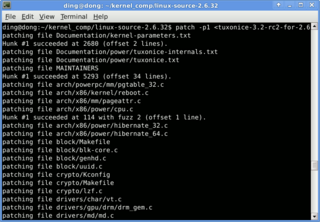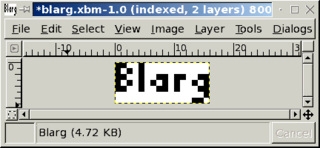
zlib is a software library used for data compression as well as a data format. zlib was written by Jean-loup Gailly and Mark Adler and is an abstraction of the DEFLATE compression algorithm used in their gzip file compression program. zlib is also a crucial component of many software platforms, including Linux, macOS, and iOS. It has also been used in gaming consoles such as the PlayStation 4, PlayStation 3, Wii U, Wii, Xbox One and Xbox 360.

bzip2 is a free and open-source file compression program that uses the Burrows–Wheeler algorithm. It only compresses single files and is not a file archiver. It relies on separate external utilities for tasks such as handling multiple files, encryption, and archive-splitting.
In computing, the utility diff is a data comparison tool that computes and displays the differences between the contents of files. Unlike edit distance notions used for other purposes, diff is line-oriented rather than character-oriented, but it is like Levenshtein distance in that it tries to determine the smallest set of deletions and insertions to create one file from the other. The utility displays the changes in one of several standard formats, such that both humans or computers can parse the changes, and use them for patching.

rsync is a utility for transferring and synchronizing files between a computer and a storage drive and across networked computers by comparing the modification times and sizes of files. It is commonly found on Unix-like operating systems and is under the GPL-3.0-or-later license.
OpenEXR is a high-dynamic range, multi-channel raster file format, released as an open standard along with a set of software tools created by Industrial Light & Magic (ILM), under a free software license similar to the BSD license.

The computer tool patch is a Unix program that updates text files according to instructions contained in a separate file, called a patch file. The patch file is a text file that consists of a list of differences and is produced by running the related diff program with the original and updated file as arguments. Updating files with patch is often referred to as applying the patch or simply patching the files.
ANIM is a file format, used to store digital movies and computer generated animations, and is a variation of the ILBM format, which is a subformat of Interchange File Format.
WavPack is a free and open-source lossless audio compression format and application implementing the format. It is unique in the way that it supports hybrid audio compression alongside normal compression which is similar to how FLAC works. It also supports compressing a wide variety of lossless formats, including various variants of PCM and also DSD as used in SACDs, together with its support for surround audio.

In computer graphics, the X Window System used X BitMap (XBM), a plain text binary image format, for storing cursor and icon bitmaps used in the X GUI. The XBM format is superseded by XPM, which first appeared for X11 in 1989.

HTTP compression is a capability that can be built into web servers and web clients to improve transfer speed and bandwidth utilization.
A variable-length quantity (VLQ) is a universal code that uses an arbitrary number of binary octets to represent an arbitrarily large integer. A VLQ is essentially a base-128 representation of an unsigned integer with the addition of the eighth bit to mark continuation of bytes. VLQ is identical to LEB128 except in endianness. See the example below.
Secure coding is the practice of developing computer software in such a way that guards against the accidental introduction of security vulnerabilities. Defects, bugs and logic flaws are consistently the primary cause of commonly exploited software vulnerabilities. Through the analysis of thousands of reported vulnerabilities, security professionals have discovered that most vulnerabilities stem from a relatively small number of common software programming errors. By identifying the insecure coding practices that lead to these errors and educating developers on secure alternatives, organizations can take proactive steps to help significantly reduce or eliminate vulnerabilities in software before deployment.
xdelta is a command line program for delta encoding, which generates the difference between two files. This is similar to diff and patch, but it is targeted for binary files and does not generate human readable output.
In computer science and information theory, data differencing or differential compression is producing a technical description of the difference between two sets of data – a source and a target. Formally, a data differencing algorithm takes as input source data and target data, and produces difference data such that given the source data and the difference data, one can reconstruct the target data.
A delta update is a software update that requires the user to download only those parts of the software's code that are new, or have been changed from their previous state, in contrast to having to download the entire program. The use of delta updates can save significant amounts of time and computing bandwidth. The name "delta" derives from the mathematical science use of the Greek letter delta, Δ or δ to denote change.
Brotli is a lossless data compression algorithm developed by Google. It uses a combination of the general-purpose LZ77 lossless compression algorithm, Huffman coding and 2nd-order context modelling. Brotli is primarily used by web servers and content delivery networks to compress HTTP content, making internet websites load faster. A successor to gzip, it is supported by all major web browsers and has become increasingly popular, as it provides better compression than gzip.
SDCH is a data compression algorithm created by Google, based on VCDIFF.
JPEG XL is a royalty-free raster-graphics file format that supports both lossy and lossless compression. It is designed to outperform existing raster formats and thus become their universal replacement.
In data compression, BCJ, short for Branch/Call/Jump, refers to a technique that improves the compression of machine code by replacing relative branch addresses with absolute ones. This allows a Lempel–Ziv compressor to identify duplicate targets and more efficiently encode them. On decompression, the inverse filter restores the original encoding. Different BCJ filters are used for different instruction sets, as each use different opcodes for branching.
The Quite OK Image Format (QOI) is a specification for lossless image compression of 24-bit or 32-bit color raster (bitmapped) images, invented by Dominic Szablewski and first announced on 24 November 2021.









